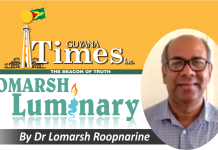If I am allowed to put a positive spin on Nobel Prize winner and literary scholar VS Naipaul’s comment that we in the West Indies are derisive mimickers of cultures, then I would say that Benny Parag’s recent musical performance on an Indian singing show is not a piffle, but a proud act.
Ben, as his family fondly calls him, and who is of Guyanese Indian extraction, two weeks ago mesmerised a number of well-known Indian celebrity judges on the Indian singing show Dil Hai Hindustani when he sang Mitwa, a song from the Indian movie, Khabi Alveh Naa Kehna, and came in among the top 10 participants. This placement guarantees the 19-year-old from a relatively unknown background in Queens, New York another opportunity to move forward and a shot at the final prize.
About mid-way through his first performance we realised that the long held belief that India amongst overseas Indians exist in nostalgic memories would not only have to be revised, but also his performance gave way impressively to a rhapsody of radiance, so much so that the judges were transfixed at Ben, nodding and giggling among themselves and asking how come a guy from an overseas country could sing an Indian song better than native Indians.
His second appearance last week was equally mesmerising, receiving approval and applause. He will sing again this upcoming week.
Ben’s performances in India have also captivated the audience there, as well as the Indo-Caribbean community in North America on social media. The entire episode is now lampooned into a classic story of a musical journey of someone leaping from the musical margin of margins, to the musical mainstream. This is a dream that is gradually becoming a reality show in and by itself, whether he makes it to the grand finale or not.
Ben was born in Queens, New York, but his parents are from Black Bush Polder, Corentyne, Guyana, which is largely an Indian agricultural community with little resources, including a lack of opportunities to progress in musicology. But this mainly rice cultivation Polder of Berbice is never known to wait for things to come or handed down to it. The community has always been known for its self-creativity and self-reliance. Nonetheless, Ben’s parents migrated to New York in the late 1980s.
In a lengthy conversation with Ben’s father, Kumar Parag, I ask him this question: What do you think has influenced your son to be so involved in Indian music? He said the family comes from a long musical tradition, mostly from his wife’s side, Sabitrie, dating back to the grandparents who were descendants of indentured labourers brought from India to work on the sugar plantations in nineteenth century British Guiana. Indian music, Kumar said, has been the magnetic mantra of the home, developed and expressed in religious settings like at Mandirs, weddings and even funerals. Put differently, Ben was born and raised around Indian music, but he has taken this experience to impressive heights.
Ben’s interest in music started at the age of four when his parents noticed something special in him and explored it further. They discovered his would be musical gurus Kinnar Seen and Payal Seen. These individuals, his mother said, had a profound impact of developing and moulding his talent. They were stern, but steady on him to develop his dream: to be in India to perform where his heart and soul is.
Like so many, I have been impressed with his sensational and professional style which are not only coterminous with, but vital to this singing competitive atmosphere of swim or sink. Like his parents, I have been impressed with his can-do attitude and his willingness to take on and explore on unexpected challenges as evidenced by his search and then audition to be on the Dil Hai Hindustani show.
What is so interesting about this young singer’s journey is that unlike most Caribbean Indians he speaks Hindi, he sings all types of classical music, and above all, instead of waiting for India to come to him though music and films, he took himself to India. The consequence is that, we the audience, is yearning for more and more. I applaud and admire his achievement, which arguably, reveals strength and discipline. I am humbled by the thought that accomplishments can only be achieved or fulfilled when there is discipline and dedication supported by talent. Ben’s story speaks to this maxim.
Whenever this young singer struts the musical stage again, whether in India, North America or in the Indo-phone Caribbean, I posit that his performance should be held up as a model to young Indian people and the like. This asking has become more serious in a noticeable fractured and fragmented Indo-Caribbean world, diaspora included, precipitated by internal and external dissonance. Ben’s music and message might help us hold the seam together, but we will need more of and like him. If I am asked to share one advice with the singer, I would reiterate what William Shakespeare penned in Twelfth Night: “If music be the food of love, then play on, give me the excess of it…” I say, sing on Ben, sing on, you have done us proud. ([email protected]).










